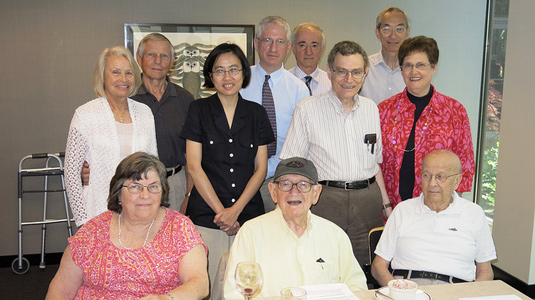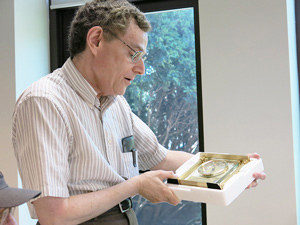Symposium Honors Morris Brodwin, Emeritus Professor in Electrical Engineering and Computer Science
Microwave expert served on Northwestern faculty from 1958 to 1994

Colleagues and academics from across the Chicago area gathered on July 14 to celebrate the accomplishments of Morris Brodwin, emeritus professor of electrical engineering and computer science at Northwestern’s McCormick School of Engineering and Applied Science.
Brodwin, an expert in microwave engineering and electromagnetics, was a member of Northwestern’s faculty from 1958 to 1994. He made important contributions to the theory of microwave mixers and undertook pioneering work on planar microwave circuits on ferrite substrates. He is an expert on microwave measurements and was the founding director of the Microwave Characterization Laboratory, which was active at Northwestern from the 1970s until his retirement.
 “Professor Brodwin was for many years the core electromagnetics experimentalist in the EECS department,” said Alan Sahakian, professor and chair of McCormick’s Department of Electrical Engineering and Computer Science. “He developed and taught many of our essential electromagnetics courses at the undergraduate and graduate levels, and he launched the careers of many world-renowned researchers including our own Professor Allen Taflove. It was wonderful to have the opportunity to honor him in this symposium with his family, colleagues, and former students present.”
“Professor Brodwin was for many years the core electromagnetics experimentalist in the EECS department,” said Alan Sahakian, professor and chair of McCormick’s Department of Electrical Engineering and Computer Science. “He developed and taught many of our essential electromagnetics courses at the undergraduate and graduate levels, and he launched the careers of many world-renowned researchers including our own Professor Allen Taflove. It was wonderful to have the opportunity to honor him in this symposium with his family, colleagues, and former students present.”
The luncheon symposium, held in the James L. Allen Center on Northwestern’s Evanston campus, included remarks by Sahakian, one of Brodwin’s former graduate students; Allen Taflove, professor of electrical engineering and computer science at McCormick, also one of Brodwin’s graduate students; Tom Wong, professor of electrical and computer engineering at the Illinois Institute of Technology; and Brodwin’s sons, David and Paul.
Brodwin received his PhD from Johns Hopkins University in 1957. In addition to studies in applied and theoretical microwave communications and radar, his main field of research was in the application of ferrites to microwave problems. After joining Northwestern’s faculty, he undertook research applying microwave techniques to study charge and anisotrophic gas plasmas, as well as using microwave characterization to study ionic transport in solid electrolytes.
Throughout his career, Brodwin mentored numerous doctoral students who went on to become university faculty and industrial leaders in the field of electromagnetics and microwave engineering, with a wide range of thesis topics including computational electromagnetics, microwave electronics, microwave instrumentation, and microwave processing of materials.